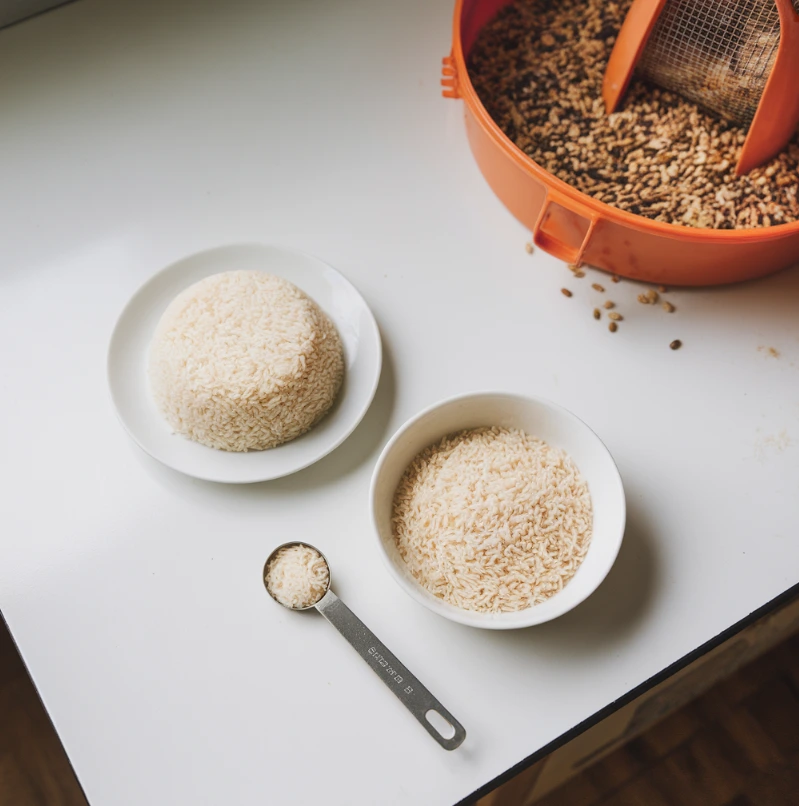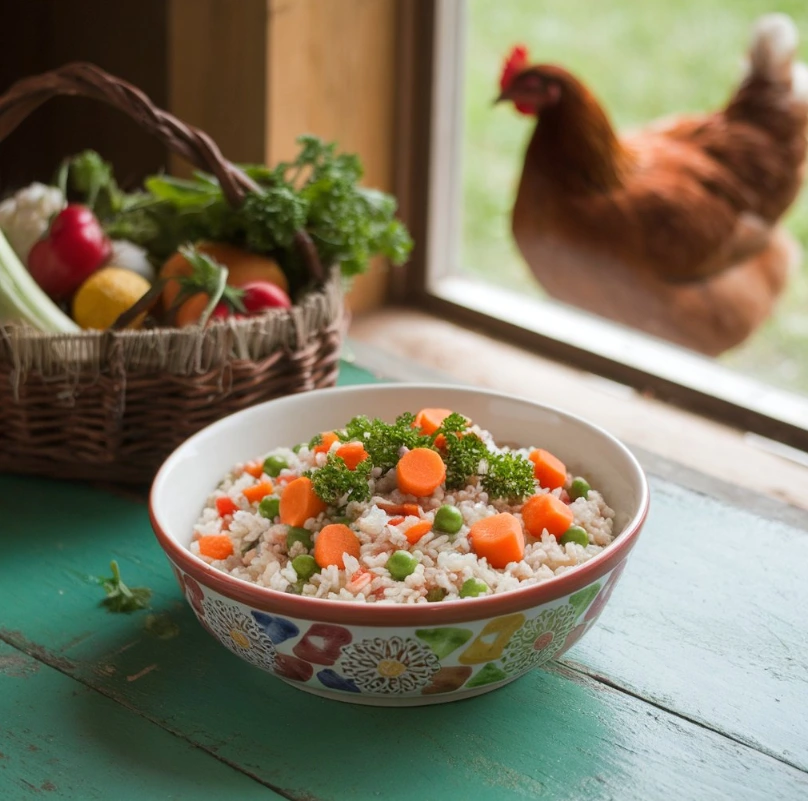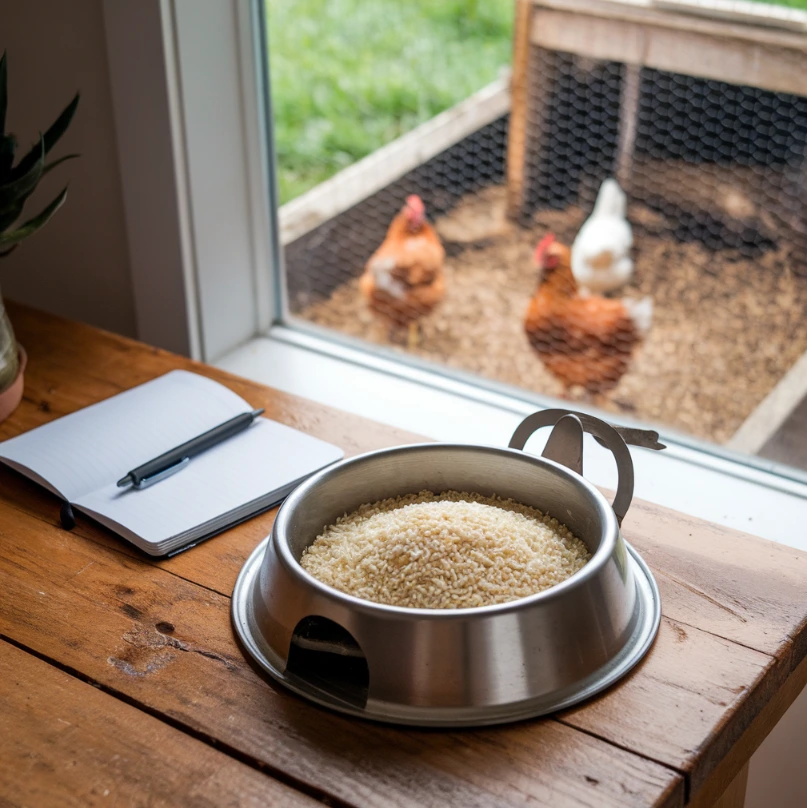Ensuring your chickens eat a balanced diet is absolutely essential for maintaining their health, happiness, and productivity. A well-rounded diet not only supports their growth and energy needs but also ensures consistent egg production and overall vitality. But what about rice? This common household staple often raises questions among chicken owners. Can chickens eat rice safely, and if so, how should it be prepared?
This article delves into everything you need to know about feeding chickens rice, from its nutritional value and safety precautions to preparation methods and creative feeding variations. For instance, we’ll discuss whether cooked or uncooked rice is better, how rice fits into a balanced diet, and innovative ways to serve it to your flock. In addition, you’ll find practical tips and insights to ensure rice is both a safe and enjoyable treat for your chickens.
By the end of this guide, you’ll have a comprehensive understanding of the role rice can play in your chickens’ feeding routine. Moreover, you’ll learn how to maximize its benefits while avoiding potential risks. Whether you’re a seasoned chicken owner or new to raising a flock, this article provides valuable information to enhance your chickens’ diet and overall well-being.
Is Rice Safe for Chickens?

Yes, chickens can safely eat rice, but certain precautions are necessary. Rice—whether cooked or uncooked—can be a nutritious treat when provided in moderation. In fact, it is a good source of carbohydrates that can fuel their daily activities. However, understanding the type, preparation, and portion size is important to avoid digestive issues.
For instance, cooked rice is a better choice for chickens due to its softness and easy digestibility. In contrast, uncooked rice, while safe in small amounts, is harder to digest and less palatable. This makes it less ideal for regular feeding. Because of this, cooked rice is the preferred option to reduce risks such as choking or crop impaction.
In addition, rice should be part of a balanced diet to ensure chickens receive all the nutrients they need. If you’re looking for more ideas to improve their diet, consider reading How Are Cheeseballs Made?. For example, this can inspire creative and diverse feeding routines for your flock.

Nutritional Value of Rice
Rice is a good source of:
- Carbohydrates: Provides energy for daily activities.
- B Vitamins: Supports metabolic processes.
- Minerals: Contains small amounts of magnesium and phosphorus.
However, while rice offers nutritional benefits, it lacks essential proteins, calcium, and vitamins that chickens need for growth and egg production. In contrast, balanced chicken feed is designed to meet all these nutritional requirements. In short, rice should supplement a balanced diet rather than replace regular feed.
Moreover, recipes like Chicken Salad Chick Recipes can inspire more nutritious combinations.
Cooked vs. Uncooked Rice: Which is Better?
For example, both cooked and uncooked rice can be safe for chickens, but each comes with unique considerations that chicken owners should carefully evaluate before deciding which to offer.
Cooked Rice
Cooked rice is softer and much easier for chickens to digest, making it an excellent choice for a treat. Additionally, the softened texture minimizes the risk of choking or crop impaction, which can be concerns with harder, uncooked grains. For instance, chickens often peck enthusiastically at softer foods like cooked rice, which makes it easier for them to consume and process. However, it is essential to ensure that the rice is plain and free of additives like salt, oil, or spices. Because of this, flavored rice could harm your chickens’ health, so sticking to plain, cooked rice is a safer option.
Uncooked Rice
Uncooked rice is generally safe for chickens when fed in small amounts, contrary to the common myth that it expands in their stomachs. In fact, chickens can process uncooked rice without issue in limited quantities. However, it is harder to digest than cooked rice and is less appealing to chickens due to its dry and firm texture. Because of this, it is not the best choice for regular feeding. In contrast, cooked rice offers better digestibility and palatability, making it a more favorable option.
In conclusion, while both types of rice can be safe, cooked rice stands out as the more practical and chicken-friendly option. Its ease of digestion and reduced risk of complications make it an ideal treat when prepared correctly. As a result, you can provide a healthier and more enjoyable experience for your flock by opting for cooked rice over uncooked varieties.
How to Feed Chickens Rice Safely
Step 1: Select the Right Type of Rice
- White Rice: Low nutritional value; suitable only as a treat.
- Brown Rice: Richer in fiber and nutrients but harder to digest.
- Wild Rice: Nutrient-dense and a great option for variety.
Step 2: Prepare the Rice Properly
- Rinse rice to remove any residual pesticides or contaminants.
- Cook rice without adding salt, butter, or seasonings.
- Allow the rice to cool before serving.
Moreover, safe preparation practices like these ensure your chickens’ health isn’t compromised.
Step 3: Offer Moderately
- Serve rice as a treat, not a staple. Aim for a maximum of 10% of their daily diet.
- Mix rice with other safe treats like vegetables or grains for variety.
For instance, recipes like Broccoli Salad can pair well with rice for your chickens.
Benefits of Feeding Chickens Rice
Energy Boost
Rice is an excellent source of carbohydrates, providing a quick and sustainable energy boost for your chickens. As a result, this energy helps fuel their daily activities, from foraging to egg production. In addition, this boost is especially beneficial during colder months when chickens require extra energy to stay warm and active.
Improved Digestion
When combined with fibrous foods, such as leafy greens or chopped vegetables, rice can aid digestion in your chickens. For instance, fibrous foods help regulate the digestive system, while rice provides a softer, palatable base. As a result, this combination promotes healthy digestion and reduces the risk of gastrointestinal issues.
Variety in Diet
Chickens thrive on diversity in their meals, and rice is a great way to introduce a new texture and flavor to their diet. Moreover, chickens enjoy exploring different foods, which keeps them curious and engaged during feeding time. In addition, adding variety to their diet prevents monotony and encourages natural foraging behaviors.
Promotes Overall Health
Providing a varied diet not only enriches your chickens’ lives but also supports their overall health. For example, the combination of rice with nutrient-dense foods ensures your flock gets a balanced mix of carbohydrates, vitamins, and minerals. In short, variety in their diet reduces boredom, promotes well-being, and contributes to the long-term productivity of your chickens.

Risks of Overfeeding Rice
While rice is generally safe and nutritious when fed in moderation, overfeeding can cause several issues that may negatively impact your chickens’ health. For instance, offering too much rice without balancing their diet can lead to unintended consequences.
- Nutritional Imbalance: Rice lacks essential nutrients such as protein, calcium, and vitamins that chickens require for optimal health. As a result, feeding excess rice may displace other vital nutrients from their diet, potentially leading to deficiencies over time.
- Crop Impaction: Overeating uncooked rice or consuming it in large quantities can increase the risk of crop impaction, where undigested food blocks the crop, preventing normal digestion. In addition, this condition may require medical intervention to resolve.
- Obesity: Rice is rich in carbohydrates, and excessive consumption can contribute to weight gain in chickens. Consequently, a high-carb diet increases the risk of obesity, which may lead to additional health issues such as decreased egg production and joint stress.
In short, while rice can be a healthy addition to your chickens’ diet, it should only make up a small portion of their overall food intake. Therefore, moderation is essential to ensure that your flock maintains a balanced diet and stays healthy.
Creative Variations for Feeding Chickens Rice
Rice and Vegetable Mix
Combine rice with chopped carrots, peas, or leafy greens to provide a nutrient-packed meal for your chickens. For example, carrots offer vitamin A, peas add protein, and leafy greens bring essential fiber, making this combination both healthy and delicious. In addition, the vibrant colors and varied textures will excite your chickens and encourage natural foraging behaviors.
Rice Mash
Mix cooked rice with chicken feed to create a soft, wholesome treat that’s easy for chickens to eat and digest. Moreover, this method ensures that the rice complements their primary diet, balancing taste with necessary nutrients. As a result, your flock will benefit from the added carbohydrates in the rice while still consuming their regular protein-rich feed.
Herbal Rice Blend
Add safe herbs like parsley or oregano to cooked rice to enhance its flavor and health benefits. Parsley is rich in vitamins, while oregano contains natural antimicrobial properties, which may help boost your chickens’ immunity. Similarly, including herbs in their diet not only improves their overall health but also makes the meal more enticing and aromatic.
Creative Feeding Keeps Chickens Engaged
Similarly, introducing creative feeding methods keeps your chickens curious and engaged, preventing boredom and encouraging them to explore new textures and tastes. For instance, you could alternate these variations to maintain excitement during feeding time.
Next Steps for You
While focusing on your chickens’ diet, don’t forget to explore creative recipes for yourself. For example, you might enjoy trying How to Make Cookies in 7 Steps as a fun kitchen project. As a result, both you and your flock can enjoy a variety of enriching meals, making feeding time a delightful experience for all!
FAQs About Feeding Chickens Rice
Can chickens eat cooked rice?
Yes, cooked rice is a safe and digestible treat for chickens. In addition, it is easier on their digestive systems compared to uncooked rice. Just ensure the rice is plain, free of any spices, salt, or butter, and cooled before feeding.
Can chickens eat rice daily?
In contrast, while rice is safe for chickens, it should only be an occasional treat. Feeding rice daily can lead to nutritional imbalances since it lacks certain essential nutrients required for their overall health and egg production.
Is uncooked rice harmful to chickens?
For example, uncooked rice is not harmful to chickens when given in small amounts. However, it is harder for them to digest and less appealing compared to cooked rice. Offering cooked rice is generally the better option.
What types of rice are best for chickens?
Brown and wild rice are the best options due to their higher nutrient content, including more fiber and essential minerals, compared to white rice. In addition, they offer better variety and nutrition for your flock.
Can chickens eat flavored rice?
No, flavored rice often contains spices, salt, or additives that can harm chickens. Because of this, it is important to stick to plain, unseasoned rice when feeding your flock.
How much rice should I give my chickens?
Rice should be offered in small quantities, making up no more than 10% of their daily diet. For instance, you can mix it with vegetables or other safe treats to create a balanced and enriching meal for your chickens.
Conclusion
In conclusion, can chickens eat rice? Absolutely! Rice can be a safe, nutritious, and enjoyable treat for your flock when it is fed in moderation and prepared with care. By incorporating rice into your chickens’ diet, you not only provide a source of energy but also introduce variety that can keep your flock engaged and satisfied. In addition, ensuring proper preparation, such as cooking rice plain and avoiding harmful additives, protects their health and allows them to benefit from this versatile food. Above all, balance is key—rice should supplement their diet rather than replace their staple feed.
Moreover, by following the tips and suggestions outlined in this guide, you can confidently offer rice to your chickens, knowing it enhances their diet without compromising their nutritional needs. Whether mixed with nutrient-rich vegetables, paired with herbs for flavor, or served as a standalone treat, rice contributes to your flock’s enrichment and well-being. For instance, adding rice can encourage natural foraging behaviors and make feeding time more enjoyable for both you and your chickens.
Finally, for more inspiration, you might enjoy exploring recipes and culinary guides from trusted sources like Tasty, AllRecipes, and Delish. As a result, these platforms not only provide excellent ideas for enhancing your own meals but also inspire creative ways to diversify your chickens’ diet. Whether for your family or your feathered friends, variety and careful preparation make every meal a treat.

